15 November 2020 - Maia Sandu wins presidential elections in Moldova
13:18 | 15.11.2021 Category:
After the 2016 presidential elections, a relative peace was established in society, as a large part of the citizens challenged the legality of the election results for the position of head of state. Let's remember that Maia Sandu's team challenged the results of the presidential election at the Constitutional Court. However, in the most dubious traditions of Moldovan justice, the Court recognized the illegal involvement of the Metropolitan Church of Moldova in the elections, the paid organization of paid electoral tourism in the eastern districts and the failure to express the right to vote for some diaspora citizens.
Igor Dodon's performance during his four-year term left little room for assertion as head of state. The fight against corruption and the return of the stolen billion were only mimicked. The massive penetration of the Russian sales market for Moldovan products was just an illusion. On the contrary, Moldova's exports to the European Union market have steadily increased and decreased to Russia. And the promise to unite society has failed through President Dodon's hateful attacks on the opposition and, in particular, on the unionists, whose share is growing from year to year. Frequent trips to Moscow and attempts to transfer image from Putin were pathetic, and in this context, Dodon lost even to the pro-Russian electorate.
Maia Sandu had a notorious performance both as prime minister and in opposition. The ease with which Dodon's socialists removed Sandu from the post of prime minister had a boomerang effect. Dodon assumed full responsibility for governance, and this was not perceived at all positively by the citizens.
The candidate of the Action and Solidarity Party had accumulated a solid amount of trust in the elections. The main chapter that Sandu raised in front of Dodon was the professionalism and balance in his public approach. At no stage could the PAS leader be blamed for populism, radical statements and attacks on social or ethnic groups. Balance was the watchword that kept Sandu away from Dodon. And this balance, once called by French election experts as the "Quiet Force", usually brought victories to those who followed this perception.
Another factor that contributed to the increase of Maia Sandu's chances in the elections was her credibility. His opponent had achieved almost nothing of his voice in the 2016 elections, and Sandu was extremely careful in his promises, which rather generates people's trust.
And perhaps the most important aspect of creating a positive image for Sandu was the fact that a woman declared war on a corrupt oligarchic system without a shadow of fear, who had seized all the tools of the state and could use them to destroy her opponents. This courage gave birth to respect and even admiration.
Towards the start of the presidential campaign, an atmosphere of sympathy for Maia Sandu and a quasi-total lack of distrust of Dodon had set in in the Republic of Moldova.
The first round of the presidential election took place on November 1. The myriad of extras who served as candidates for the position of head of state did not allow a clear victory for Maia Sandu in the first round. Many votes were dissipated, and the low turnout generated a result below expectations. The percentages accumulated by the extras show how pride or commitment turned the first round into a childish and damaging game for those who claimed to be appointed politicians. Only Renato Usatii was able to accumulate a number of votes to confirm a real intention to fight for the chair of the country's president.
Thus, in the first round the first two places were occupied by Maia Sandu with 36.6% and Igor Dodon with 32.6%. If we look at the atmosphere in the country, it was an unexpectedly good result for Dodon.
The second round was marked by an unprecedented mobilization of Maia Sandu's supporters. This was noticed throughout the day on November 15, when there was an increased turnout from one hour to the next. The difference of almost 10 percent in the second round compared to the first made the final results clear. There was also an exemplary mobilization in the diaspora, the increase in turnout being substantial.
The results coming to the Central Electoral Commission, even from the first minutes after the polls closed, left no room for interpretation. Maia Sandu accumulated many votes even in the districts where the communist-socialist left traditionally dominated. The day of November 15 did not even end, because Maia Sandu's categorical victory had become clear. The score was predictable, but for a patriarchal and nostalgic Moldova it was still a revelation. Never in modern history has a right-wing party accumulated such a clear majority and won such a convincing victory.
The transformation of the Republic of Moldova is a difficult and long process. This includes justice, economics, education, foreign policy, but also other vital areas. In addition to the battles, the government is obliged every day to demonstrate more openness to citizens, the ability to communicate with society to include it in the processes of participatory democracy and obviously economic results with social impact. Step by step, Moldova must return to normalcy in order to safely allow itself to begin an unprecedented reconstruction of the country.




